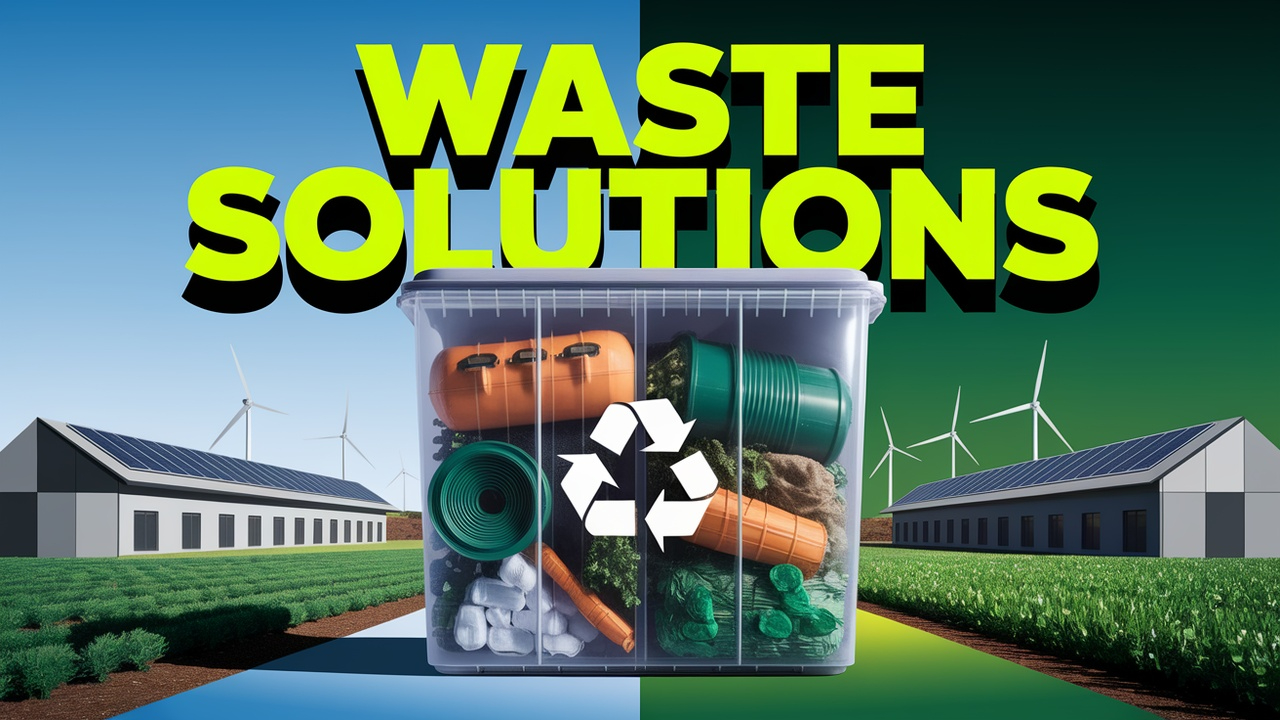
This comprehensive course explores the critical aspects of waste management and recycling within the agricultural sector. Participants will learn about sustainable practices, waste reduction strategies, and innovative recycling methods that enhance soil health and reduce environmental impact.
Course Levels
-
Level 1: Introduction to Waste Management in Agriculture
This level introduces the basics of waste management in agricultural settings, emphasizing the importance of proper waste handling and its effects on sustainability.
-
Level 2: Waste Characterization and Assessment
In this level, learners will assess different types of agricultural waste, focusing on characterization methods and their implications for management.
-
Level 3: Waste Reduction Strategies
This level covers various strategies for reducing waste generation in agricultural practices, highlighting the role of innovative technologies and management practices.
-
Level 4: Recycling and Reuse Methods
Learners will explore various recycling and reuse methods applicable to agricultural waste, focusing on practical applications and case studies.
-
Level 5: Soil Health and Waste Management
This level emphasizes the relationship between waste management practices and soil health, discussing techniques that enhance soil quality through organic waste utilization.
-
Level 6: Economic and Environmental Impacts
Participants will examine the economic benefits and environmental impacts of effective waste management and recycling practices in agriculture.
-
Level 7: Policy and Community Engagement
This level focuses on the role of policy and community engagement in promoting sustainable waste management practices in agriculture.
-
Level 8: Future Trends and Innovations
Learners will explore future trends and innovations in waste management and recycling in agriculture, preparing them for advancing practices in the field.
Course Topics
-
Sustainable Farming Economic Models
# Sustainable Farming Economic Models Sustainable farming is not only about environmentally friendly practices; it also necessitates a robust economic model to ensure that farms remain viable in the ...
-
Digital Solutions for Waste Tracking
# Digital Solutions for Waste Tracking ## Introduction In the modern agricultural landscape, effective waste management has been revolutionized by digital solutions. These technologies not only enhan...
-
Basic Waste Management Practices
# Basic Waste Management Practices Waste management is a crucial aspect of sustainable agriculture. Effective waste management practices help minimize environmental impact, improve farm efficiency, a...
-
Utilizing Waste for Bioenergy
# Utilizing Waste for Bioenergy ## Introduction Bioenergy is a renewable energy source derived from organic materials, known as biomass. Utilizing waste for bioenergy not only helps in waste manageme...
-
Developing a Waste Management Plan
# Developing a Waste Management Plan ## Introduction A Waste Management Plan (WMP) is an essential document that outlines how waste will be managed in a specific area, particularly in agricultural se...
-
Efficient Resource Use
# Efficient Resource Use ## Introduction Efficient resource use is a critical aspect of waste reduction strategies in agriculture. By optimizing the use of resources such as water, energy, and materi...
-
Sustainable Practices in Urban Agriculture
# Sustainable Practices in Urban Agriculture Urban agriculture is increasingly recognized as a crucial component of sustainable urban development. This topic explores innovative practices that can en...
-
Overview of Agricultural Waste
# Overview of Agricultural Waste Agricultural waste refers to the by-products generated from agricultural activities, which include farming, livestock production, and food processing. Understanding a...
-
Circular Economy in Agriculture
# Circular Economy in Agriculture The circular economy (CE) is a transformative model that seeks to eliminate waste and promote the continual use of resources. In agriculture, the circular economy fo...
-
Best Practices for Soil Management
# Best Practices for Soil Management Soil management is a crucial aspect of sustainable agriculture and waste management. Proper management enhances soil health, increases productivity, and minimizes...
-
Stakeholder Collaboration
# Stakeholder Collaboration Stakeholder collaboration is a crucial aspect of effective waste management and recycling in agriculture. It involves engaging various parties, including farmers, local go...
-
Data Collection Techniques
# Data Collection Techniques Data collection is a critical component in waste characterization and assessment within the realm of waste management and recycling in agriculture. Understanding how to e...
-
Cost-Benefit Analysis of Waste Management
# Cost-Benefit Analysis of Waste Management Waste management is a critical aspect of agriculture that impacts both the environment and the economy. A Cost-Benefit Analysis (CBA) serves as a systemati...
-
Importance of Waste Management
# Importance of Waste Management Waste management is a critical aspect of agricultural practices that not only influences productivity but also impacts the environment, health, and economics of farmi...
-
Identifying Hazardous Waste
# Identifying Hazardous Waste Hazardous waste is any material that is no longer needed and poses a risk to human health or the environment. It can arise from various agricultural activities, includin...
-
Climate Change and Agriculture
# Climate Change and Agriculture Climate change is profoundly impacting agricultural systems across the globe. Understanding these effects is crucial for developing sustainable practices that can mit...
-
Government Policies on Waste Management
# Government Policies on Waste Management Waste management is an essential aspect of environmental protection and public health. Governments worldwide have established policies to regulate waste mana...
-
Soil Amendments from Agricultural Waste
# Soil Amendments from Agricultural Waste Soil health is a cornerstone of sustainable agriculture, and one effective way to enhance soil quality is through the use of soil amendments derived from agr...
-
Case Studies of Successful Recycling Initiatives
# Case Studies of Successful Recycling Initiatives Recycling is a crucial component of sustainable waste management, especially in agriculture. This section explores several successful recycling init...
-
Waste Composition Analysis
# Waste Composition Analysis Waste composition analysis is a vital process in waste management and recycling, particularly in the agricultural sector. It involves assessing the types and quantities o...
- And 20 more topics...